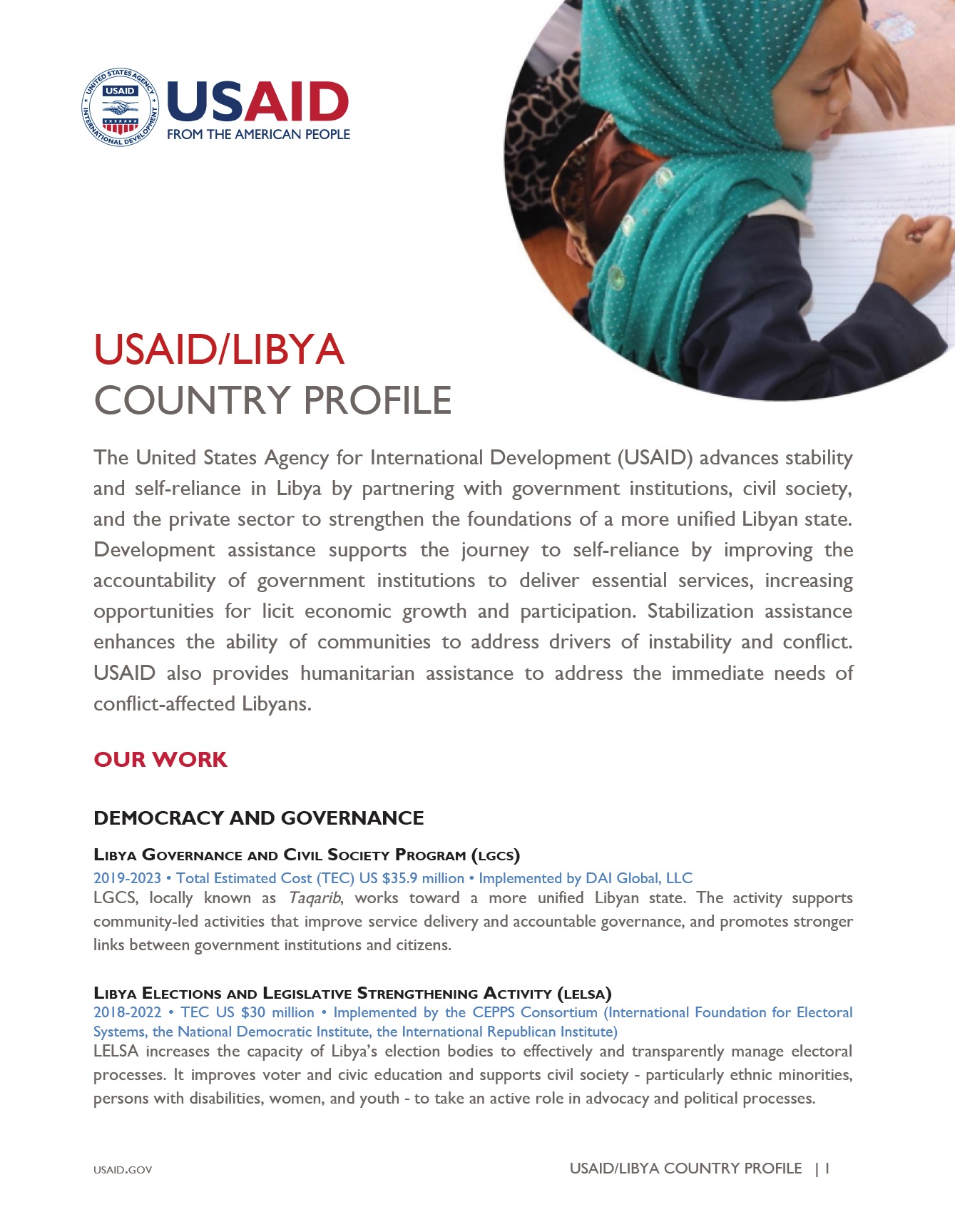Speeches Shim
The United States Agency for International Development (USAID) supports Libya’s transition to a more democratic and peaceful nation. USAID works with municipal councils, national government institutions, entrepreneurs, and a range of civil society groups, including those representing women, youth and marginalized communities, in their efforts to improve Libyan lives.
Our Work
USAID/Libya Country Profile ![]() (pdf - 429k)
(pdf - 429k)
The United States Agency for International Development advances stability and self-reliance in Libya by partnering with government institutions, civil society, and the private sector to strengthen the foundations of a more unified Libyan state. Development assistance supports the journey to self-reliance by improving the accountability of government institutions to deliver essential services, increasing opportunities for licit economic growth and participation, and enhancing the ability of communities to address drivers of instability and conflict. USAID also provides humanitarian assistance to address the immediate needs of conflict-affected Libyans.
DEMOCRACY AND GOVERNANCE
Libya Governance and Civil Society Program (LGCS)
2019-2023 • Total Estimated Cost (TEC) US $35.9 million • Implemented by DAI Global, LLC
LGCS, locally known as Taqarib, works toward a more unified Libyan state. The activity supports community-led activities that improve service delivery and accountable governance, and promotes stronger links between government institutions and citizens.
Libya Elections and Legislative Strengthening Activity (LELSA)
2018-2022 • TEC US $30 million • Implemented by the CEPPS Consortium (International Foundation for Electoral Systems, the National Democratic Institute, the International Republican Institute)
LELSA increases the capacity of Libya’s election bodies to effectively and transparently manage electoral processes. It improves voter and civic education and supports civil society - particularly ethnic minorities, persons with disabilities, women, and youth - to take an active role in advocacy and political processes.
Promoting Leadership and Activism of Youth for Peace in Libya (PLAY)
2020-2022 • Total Estimated Cost (TEC) US $1.5 million • Implemented by International Rescue Committee (IRC)
The Conflict and Management (CMM) project, PLAY, works towards reducing the likelihood of violence in Tawergha, Bani Walid, and Misrata by promoting reconciliation through positive interaction and strengthening youth to youth relationships, and promoting youth civic participation in each of the three cities.
ECONOMIC GROWTH
Libya Public Financial Management (LPFM)
2019-2024 (2 base years + 3 option years) • TEC US $14.9 million* • Implemented by The Pragma Corporation
*Subject to availability of funds, and a decision to exercise option years, TEC is up to $55 million over five years.
LPFM helps the Government of Libya strengthen macroeconomic and fiscal foundations for sustainable and inclusive growth by improving financial management at the national and sub-national levels, making the business enabling environment more conducive to growth, and supporting energy sector reforms.
STABILIZATION
Libya Transition Initiative (LTI) 3
2017-2021 • TEC US $106.5 million • Implemented by Chemonics, Inc.
LTI 3 supports locally-tailored projects in strategic areas across Libya to strengthen stability and conditions enabling political compromise. Activities address pressing community grievances and restore basic services, support civilian institutions, and strengthen moderate actors in civil society and local government.
HUMANITARIAN ASSISTANCE
USAID’s Bureau for Humanitarian Assistance (BHA) has invested more than $43 million in Libya since 2011, with over $10 million in fiscal years 2018 and 2019 alone, to address the immediate needs of internally displaced and returning populations and assist communities affected by conflict. BHA provides support in areas of health, protection, humanitarian coordination and information management, logistics, and more.
COVID-19 RESPONSE
Since the spread of COVID-19, USAID has committed nearly $15 million to support Libya’s response to the pandemic. USAID is building on its partnerships with the Government of Libya (GoL), Libyan institutions, and civil society to spearhead donor support to the health sector, coordinate self-saving assistance, prioritize investments to respond to evolving public health needs by ensuring delivery of essential services, and provide assistance to spur Libya’s economic recovery.


Comment
Make a general inquiry or suggest an improvement.